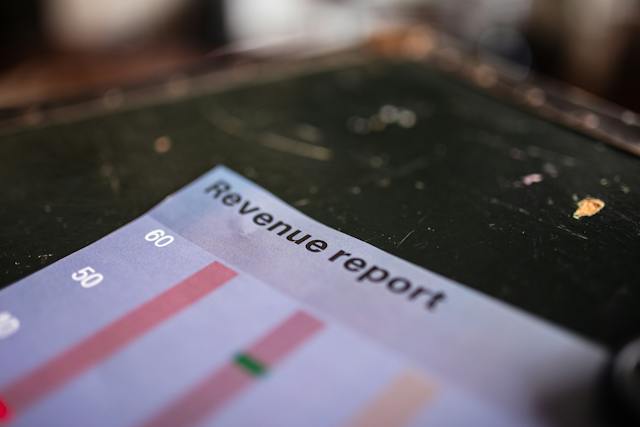Revenue forecasting is an integral part of any business as it is the process of estimating what your revenue will be in a specific time period based on your current and previous performance. Typically, it is calculated annually or quarterly. This process is considered vital since it helps in budgeting, informed decision-making, and cash flow management.
For revenue forecasting, bookings is a powerful metric. In the SaaS world, bookings are a forward-looking metric, seen as a commitment a customer makes to pay for your service over a certain time period. Bookings usually include a legal agreement. This metric is an excellent way to figure out how well you are marketing the value of your product or service. Therefore, it provides insight into the company’s future revenue potential, which can also reflect the company’s current cash flow.
Accurate booking data can help improve forecasting accuracy as you will be able to understand customer demand trends and patterns. It can also help in operational efficiency. Businesses can optimize their operations and allocate staff efficiently based on bookings data to improve future revenue. As a result, your customer satisfaction can also increase as you effectively meet your customer’s demands. This will ultimately lead to improved customer satisfaction and loyalty.
The Importance of Forecasting Revenue
Revenue forecasting, also called revenue projection, is the process that allows a company to estimate the future revenue of a company. It is typically based on historical and current data. Still, it can also be influenced by external factors like economic trends and market conditions. The main goal of revenue forecasting is to predict and plan for how much money your company will earn over the next few months. Such metrics allow you to decide whether or not you can afford to hire more employees or stock up on inventory.
There are many benefits of accurate revenue forecasting for businesses. Firstly, since they can predict how much money they will need to keep a company afloat, it allows them to keep an eye on the cash flow to ensure smooth running of operations. Secondly, it will enable them to predict whether or not they can hire new employees or scale up operations to meet product or service demands. Lastly, businesses can avoid sale shortages by indicating how much inventory they will need based on the current inventory.
Despite its benefits, it is almost impossible to predict your revenue accurately to the dollar. One of the biggest challenges of forecasting is the use of subjective information. Many teams have to estimate numbers, which can lead to an inaccurate revenue forecast. There are also economic concerns such as economic growth rate, inflation, and labor supply, which are subject to change. Therefore, businesses have to see and understand a broader financial picture when forecasting revenue.
Understanding Bookings Data
Booking is a forward-looking metric that indicates a customer’s commitment to spending money over a specific period in exchange for a product or service. This commitment is usually tied to a contract signed during the signup process. Keeping track of booking data is crucial as it can help gauge the overall sales health and business growth. If your B2B SaaS business has a subscription, bookings hold significance as it provides insights into potential revenue and market responses.
There are various kinds of bookings that B2B and other businesses use. These include new bookings, renewal bookings, and upgraded or expansion bookings. New bookings encompass new customers, subscriptions, and existing customers subscribing to new services. Renewal bookings cover existing contacts that are up for renewal. These are calculated either at the renewal date or upon receiving a renewal request. Upgraded or expansion bookings include additional bookings that come from upselling or upgrades, where customers sign up to receive higher-tier services.
ACV/TCV bookings and Non-recurring bookings are also widely used. ACV stands for Annual Contract Value, which usually applies to a multiple-year contract. Non-recurring bookings are those which do not have to be repaid. These usually include installation fees, set-up fees, and discounts.
Reliable booking data is important for revenue forecasting as it provides valuable insights and a solid foundation for making accurate revenue forecasts. Accurate booking data can also help you understand your customer’s behavior and demand patterns. This is crucial as you can plan better and identify trends, enabling businesses to make the most of peak seasons and have their customers coming back. It can also help optimize pricing, allowing businesses to accurately price their products and services based on customer response. By tracking bookings and associated revenue, a business can assess the impact of price changes on revenue streams.
Forecasting Revenue by Incorporating External Factors
Booking data can be used to forecast revenue by incorporating external factors and market trends. This help provides valuable insights and a broader context, which can significantly impact your company’s revenue forecasts.
Marketing Dynamics and Trends
External factors, such as market trends, competitive landscape, and growth rates, can influence the revenue generated by your company. Through monitoring and analyzing these factors, businesses can better understand their existing market and adjust their revenue forecast accordingly.
Economic Indicators
Economic indicators, including inflation rates, consumer spending patterns, GDP growth, and interest rates, play an important role in revenue forecasting. This help provides insights into the overall health of the economy and its impact on consumer purchasing power. By considering these economic indicators, you can align your revenue with the current economic conditions and make decisions accordingly.
Industry-specific Factors
Each industry has its own unique internal and external factors that influence revenue forecasts. It is also important to consider these industry-specific factors and take them into account to ensure accurate revenue forecasts.
Best Practices for Effective Revenue Forecasting with Bookings Data
It is important to follow the best practices when making revenue forecasts by ensuring data accuracy and integrity, establishing a robust data collection mechanism and regularly monitoring the incoming data and market trends.
Ensuring Data Accuracy and Integrity
When gathering booking data, the data has to be as accurate as possible. This means including all relevant information, such as customer details, contract terms, booking dates, and associated revenue. To improve the accuracy of the data, external factors, such as market trends, industry dynamics, and economic indicators also have to be considered for a clearer picture.
Establishing a Robust Data Collection and Management Process
By ensuring you have a robust data collection and management process in place, you can use booking data to forecast your revenue effectively. Standardizing data collection procedures, having clear data collection objectives, and robust data security and privacy measures help a business establish a solid data collection process.
Adopting Appropriate Forecasting Models and Techniques
Using appropriate forecasting models and techniques to analyze bookings data includes using time series analysis, regression analysis, or predictive analytic algorithms. Businesses can choose one based on the nature of their business and the level of complexity they are willing to deal with for accurate forecasts.
Regularly Monitoring and Updating Revenue Forecasts Based on New Data
Continuously evaluating the accuracy of your revenue forecasts against actual revenue performance and taking timely notice of deviations is important for monitoring business growth. Such evaluations help refine the forecasting models and adjust assumptions to improve the accuracy of forecasting. A feedback loop between the forecasting process and the actual revenue allows businesses to improve and refine their forecasting models.
Conclusion
Booking data can provide valuable insights into customer commitments and future revenue potential. It allows you to understand customer demand trends and patterns, which can help improve forecasting accuracy. Accurate booking data plays a pivotal role in improving revenue forecasting as it enhances visibility, operational efficiency and optimizes pricing strategies. Businesses that recognize the value of leveraging booking data for decision-making and planning can gain a competitive edge and drive sustainable growth.


